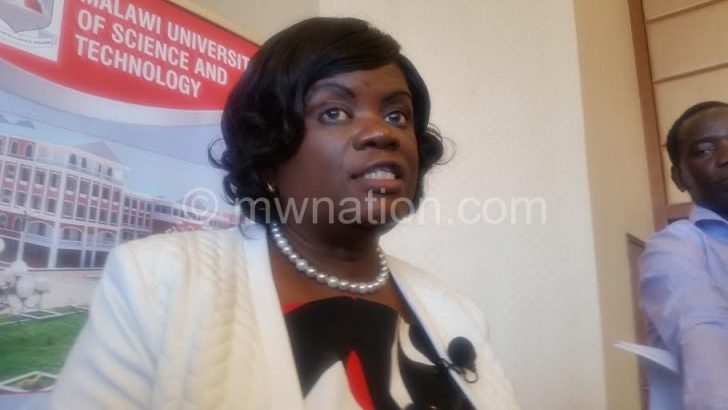Address Malata, first female Vice-Chancellor
Professor Address Malata has much passion for girls. She believes she will live her whole life serving girls and women in the country, particularly those that are disadvantaged.
“When I look at young girls, I believe they are capable of making a difference in their communities. Being where I am, I decided to get some girls from my village and sent them to school. They have learnt and are now pursuing their own careers,” she said.

Not only has she supported girls from her own village, she has also supported other girls to pursue secondary and university education in different institutions.
A model for many girls in the country and beyond, she is the First Vice-Chancellor of the Malawi University of Science and Technology (Must), and the first female to hold such a high position in a public university in Malawi.
“I did not get this position because I am a woman. I had to compete just like everyone else who applied for the job. I had to go through interviews and I did well in those interviews,” she explained.
Must is the fourth public university in the country. It was established on December 17 2012 with the vision to be a world-class centre of science and technology education, research and entrepreneurship.
It was established to promote the development, adaptation, transfer and application of science, technology and innovation for both the macro and micro-economic development of Malawi.
Apart from her position as Must vice-chancellor, Malata is former vice-president of International Confederation of Midwives, and she said she did it for African women. She joined Must, as deputy vice-chancellor in early 2016 and was appointed to her current position in August 2016.
A trained nurse and midwife as well as career academic, Malata previously served as principal of Kamuzu College of Nursing (KCN)—between 2008 and February 2016—when she spearheaded the development and implementation of six master’s programmes and three PhD programmes. She also led in the diversification of undergraduate programmes and the upgrading of Bachelor of Science programmes from six in 2008 to 19 in 2015.
Furthermore, she promoted faculty capacity building, increasing the number of KCN faculties with PhDs from five to 30.
The 53-year-old has also supported nursing and midwifery students in Malawi and the Africa region to pursue postgraduate studies globally.
Malata attained her Bachelor of Science in Nursing with distinction from University of Malawi in 1995, before proceeding to read for a Master of Science and PhD from Edith Cowan University in Australia.
She did not get to where she is easy; she had to work hard to get there. No one in her village went to secondary school, except her and her siblings. She says: “I come from a humble background, growing up in a mission station. At some point, I even went to school without shoes. But I defied all the odds, worked hard and attained education even at this level.”
Malata has been actively involved in resource mobilisation, which saw KCN students receive scholarships for both undergraduate and postgraduate training, as well as infrastructure development at the Lilongwe campus and the new Blantyre campus at Kameza.
She is past president of Africa Honour Society of Nursing of Sigma Theta Tau International (STTI) and is also a Virginia Henderson Fellow of STTI, and an Adjunct Professor for Michigan State University.
She received a Doctor Honaris Cuasa by University of Oslo in Norway, and an Award of Excellence in Nursing and Midwifery by the National Organisation of Nurses and Midwives of Malawi.
The academician has also been a Fellow of the American Academy of Nursing since 2014 and was awarded a Medal of Distinction by the University of Malawi for being one of the first female professors.
Professor Malata has been Principal Investigator/Co-Principal Investigator for research projects focusing on Sexual and Reproductive Health and has published in numerous International Peer Reviewed Journals.
She has been appointed as Lancet Global Commissioner on Quality of Maternal and New Born and child Health.
She notes that leadership is not always about being happy as there are times when you face challenges, calling for the need to hold on to something.
“Being a Christian, I hold on to my faith, because there are certain points when your colleagues may not be there for you but i have faith and that gets me through,” she says.
Beyond that, she stressed on the importance of having people that can inspire you in your life.
“If you do not have role models or people you look up to in life, you just think that everything is alright. Actually at every point in my life, even now, there are people that I admire …people outside my institution that I know are doing well in leadership and making a difference. I always look at who can inspire me,” she said.
Born on 24 March 1964, Malata went to Nkhoma Primary School in Lilongwe, and proceeded to Lilongwe Girls for her secondary school studies from 1980 to 1983.





